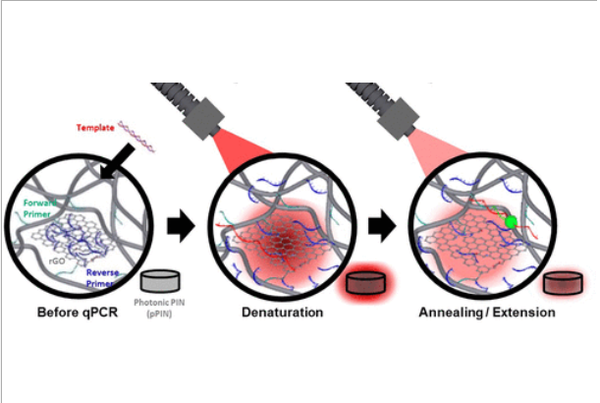The Korea Institute of Science and Technology (KIST) 's Center for Augmented Safety Systems with Intelligence, Sensing and Tracking has developed a technology that can reduce the existing polymerase chain reaction (PCR) test time to five minutes, while having the same diagnostic performance as the existing test method.
PCR technology is a molecular diagnostic technology that detects target nucleic acids by amplifying the amount of DNA. Since its development in 1984, it has made tremendous progress in the life sciences.
PCR technology has become familiar to the general public due to the Covid-19 epidemic.
However, due to the technical nature of the PCR test, it took at least one to two hours for the test due to repeated temperature cycles, and the results could not be immediately known on the spot.
To resolve this time lag, the team, led by Professors Kim Sang-kyung and Jung Seung-won at the university, developed a technology that can reduce the existing PCR test time by more than 10 to under five minutes using photothermal nanomaterials.

Photothermal nanomaterials are materials that generate heat by receiving light, and are characterized by rapidly generating high heat immediately upon irradiation with light.
As a result, photothermal nanomaterials are very efficient in rapidly raising the temperature, but they need help because they are difficult to maintain performance due to their low stability.
To overcome the instability of photothermal nanomaterials, the KIST research team produced a polymer composite that can physically hold photothermal nanomaterials, and successfully developed a compact PCR drive device without a heat plate.
Also, by implementing a multi-diagnosis technology that diagnoses several microparticles at once, it was possible to distinguish several types of Covid-19 variants with a single PCR test.
"Through additional research, we plan to miniaturize the ultra-high-speed PCR technology within this year and develop it into a device that can be used anywhere," Professor Kim said. "We expect that it will become a precision diagnostic device that can be used at primary local clinics, pharmacies, and even at-home while maintaining the strength of PCR as an accurate diagnosis."
The research, titled "Ultrafast Real-Time PCR in Photothermal Microparticles," was published in ACS Nano in its most recent online edition.

